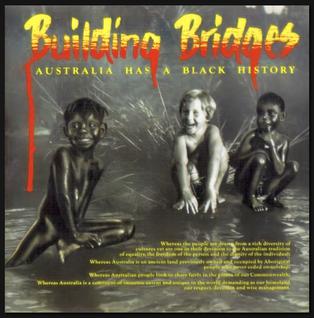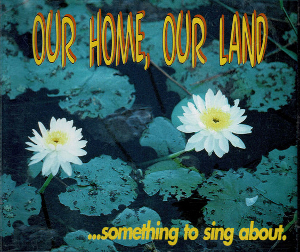Related Research Articles

Melanie Therese Shanahan was an Australian world-folk singer-songwriter, choir director and vocal coach. She was a member of the groups, Arramaieda (1987–95) and Akasa (1998–2002). She also collaborated with Coco's Lunch and Safara. Shanahan had mental health problems from the 1990s, and she died from suicide at the age of 39.
TAFE NSW is an Australian vocational education and training provider. Annually, the network trains over 500,000 students in campus, workplace, online, or distance education methods of education. It was established as an independent statutory body under the TAFE Commission Act 1990. The Minister for Regional Development, Skills and Small Business is responsible for TAFE NSW.
Tiddas were an all-female folk trio from Victoria, Australia.
Kevin Daniel Carmody, better known by his stage name Kev Carmody, is an Aboriginal Australian singer-songwriter and musician, a Murri man from northern Queensland. He is best known for the song "From Little Things Big Things Grow", which was recorded with co-writer Paul Kelly for their 1993 single. It was covered by the Get Up Mob in 2008 and peaked at number four on the Australian Recording Industry Association (ARIA) singles charts.

"From Little Things Big Things Grow" is a protest song recorded by Australian artists Paul Kelly & The Messengers on their 1991 album Comedy, and by Kev Carmody on his 1993 album Bloodlines. It was released as a CD single by Carmody and Kelly in 1993 but failed to chart. The song was co-written by Kelly and Carmody, and is based on the story of the Gurindji strike and Vincent Lingiari as part of the Indigenous people's struggle for land rights in Australia and reconciliation.
The NAISDA Dance College is a performing arts training college based in Kariong, New South Wales for Aboriginal and Torres Strait Islander people in Australia. It was established as the Aboriginal Islander Skills Development Scheme (AISDS) in 1975, which became the National Aboriginal and Islander Skills Development Association (NAISDA) in 1988. The date of establishment of the college is usually cited as 1976, although some sources report it as 1975.
ABC Television is the general name for the national television services of the Australian Broadcasting Corporation (ABC). Until an organisational restructure in 2017/2018, ABC Television was also the name of a division of the ABC. The name was also used to refer to the first and for many years the only national ABC channel, before it was renamed ABC1 and then again to ABC TV.
Heartland, known as Burned Bridge in some countries, is an Australian television drama series that ran on ABC Television in 1994. It ran for 13 episodes and starred Cate Blanchett and Ernie Dingo, as well as a large number of Aboriginal Australian actors.
The 2007 Deadly Awards took place at the Sydney Opera House Concert Hall. Featured guests included many people associated with the 1967 Referendum. Guest performances included Jessica Mauboy, Casey Donovan, Lou Bennett, Michael Tuahine and Kutcha Edwards, and several South Sydney Rabbitohs. The awards were an annual celebration of Australian Aboriginal and Torres Strait Islander achievement in music, sport, entertainment and community.
Buried Country is the name of a documentary film, book, and soundtrack album released in 2000, and a stage show which toured from 2016 to 2018. A prosopography created by Clinton Walker, it tells the story of Australian country music in the Aboriginal community by focussing on the genre's most important stars.
Djaambi were an urban rock band formed in 1989 by Richard Frankland (ex-Interaction) on lead vocals and saxophone, with both Aboriginal and white members. Initially a ten-piece, they had a variable line-up and sometimes had 15 performers. The word, djaambi, is "brother" in an Aboriginal language. The group released a self-titled album in 1990 and supported Prince on his Australian Tour in 1992.
Rachael Zoa Maza is an Indigenous Australian television and film actress and stage director.

Building Bridges is an Australian compilation album containing tracks from both Aboriginal and non-Aboriginal performers, inspired by a 1988 community concert called Building Bridges. The concert was held in Australia's Bicentennial year, which included many Aboriginal protests.

The Purple Jacaranda was an Australian television mini-series which aired on ABC in 1964 based on a novel by Nancy Graham. Cast included James Condon, Margo Lee, Ronald Morse, Diana Perryman, Walter Sullivan and John Unicomb.
Blood Brothers is a 1993 four-part Australian documentary film series that tells the stories of three different Aboriginal Australian men, and an Aboriginal ceremony.
The 1996 Deadly Awards were hosted by Rhoda Roberts at the Metro Theatre in Sydney on 1 October 1996. Presenters included Nicky Winmar, Toni Janke, Warren Fahey and Triple J's Chris Thompson. The awards were an annual celebration of Australian Aboriginal and Torres Strait Islander achievement in music, sport, entertainment and community.

Our Home, Our Land is a compilation album released in Australia by CAAMA in 1995. It was released to celebrate the victory in the Mabo case. It focused on the importance of land to the Aboriginal and Torres Strait Islander beliefs. It was nominated for a 1996 ARIA Award for Best Indigenous Release.
Elaine Crombie is an Aboriginal Australian actress, known for her work on stage and television. She is also a singer, songwriter, comedian, writer and producer.

Lillian Crombie, also known as "Aunty Lillian", was an Aboriginal Australian actress and dancer, known for her work on stage, film and television.

Brenda Gifford is a Yuin classical composer, saxophonist and pianist. She was a member of the Australian rock band Mixed Relations and is an archivist in the Indigenous Collection Branch of the National Film and Sound Archive of Australia (NFSA).
References
- ↑ Date, Margot (4 August 1993), "Black in focus", The Sydney Morning Herald
- ↑ Danielson, Shane (7 December 1992), "Koori vision", Tribune
- ↑ Date, Margot (19 July 1993), "Blackout visits the red, white and blue", The Sydney Morning Herald
- ↑ Mangan, John (27 December 1990), "Series returns with more subtle approach", The Age
- ↑ Warneke, Ross (11 May 1989), "Aboriginal issues No. 2", The Age
- 1 2 "ABC TV". Tribune . No. 2559. New South Wales, Australia. 10 May 1989. p. 10. Retrieved 1 February 2024– via National Library of Australia.
- ↑ "Blackout. Series 1", ABC News, 1999
- ↑ Brady, Nicole (25 November 1993), "Blackout issues showcased", The Age
- ↑ Knox, David (13 August 2021). "Friday Flashback: Aaron Pedersen hosts Blackout". TV Tonight. Retrieved 1 February 2024.
- ↑ Tuohy, Wendy (25 November 1993), "'Blackout', fresh views of Aboriginal society in focus", The Age
- 1 2 "BLACKOUT". The Canberra Times . Vol. 67, no. 21, 057. Australian Capital Territory, Australia. 7 December 1992. p. 27. Retrieved 1 February 2024– via National Library of Australia.
- ↑ "Bill Board". Tribune . No. 2590. New South Wales, Australia. 13 December 1989. p. 22. Retrieved 1 February 2024– via National Library of Australia.
- ↑ "Magazine: Entertainment". The Canberra Times . Vol. 64, no. 17, 779. Australian Capital Territory, Australia. 3 December 1989. p. 25. Retrieved 1 February 2024– via National Library of Australia.
- ↑ "Blackout". The Canberra Times . Vol. 65, no. 20, 372. Australian Capital Territory, Australia. 21 January 1991. p. 24. Retrieved 1 February 2024– via National Library of Australia.
- ↑ "ABC Highlight of the Week: Blackout". Torres News . No. 8. Queensland, Australia. 4 December 1992. p. 1 (TV Entertainment Guide). Retrieved 1 February 2024– via National Library of Australia.
- ↑ "BLACKOUT". Torres News . No. 58. Queensland, Australia. 19 November 1993. p. 1 (TV Entertainment Guide). Retrieved 1 February 2024– via National Library of Australia.
- ↑ "BLACKOUT". Torres News . No. 110. Queensland, Australia. 18 November 1994. p. 1 (TV Entertainment Guide). Retrieved 1 February 2024– via National Library of Australia.